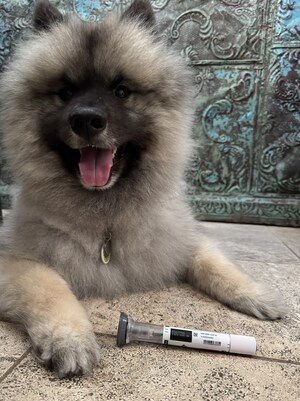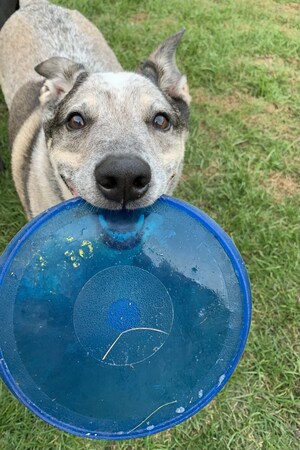The Amount of Medication Consumed Would Kill Most Pets
MINNEAPOLIS, July 12, 2023 /PRNewswire/ -- Anyone with a pet large enough, or agile enough, to reach the top of a counter knows that nothing is safe. While most people are worried about animals stealing food, a potentially more dangerous situation occurs when pets accidentally ingest human medications left out where a pet can reach them.
"My mom has prescription skin cream to treat cancer that comes in a pump container," said Carson Gilchrist, who lives in Basalt, Colo. "We thought it was empty, so we placed it on the kitchen counter by the phone to remind us to order more. While we were out of the house, our dog Josephine jumped up and pulled the container off the counter and chewed it all up. At first, we didn't consider the contents because there was no warning on the container and we thought it was empty, but later that night she started vomiting and we realized something was wrong. We called our local veterinarian, and he suggested we call Pet Poison Helpline."
"We receive thousands of calls involving pets who have snatched medication off a counter when their human isn't looking, but this type of medication can be particularly deadly, even in small amounts," said Dr. Renee Schmid, a senior veterinary toxicologist at Pet Poison Helpline. It turns out Josie had ingested a cancer treatment containing medication known as Fluorouracil (5-FU) and calcipotriene, two of the most dangerous topical toxins to both dogs and cats. It is used to treat human skin cancers such as superficial basal cell carcinoma and actinic keratosis.
"While the intravenous form of 5-FU may be used in dogs for certain cancers, the topical version is very poisonous when ingested by dogs or cats," added Dr. Schmid. "Even very small amounts of it can be extremely toxic and can result in acute gastrointestinal signs (e.g., vomiting, diarrhea), central nervous system signs (e.g., tremors, seizures, etc.), and bone marrow suppression. 5-FU is rapidly absorbed from the gastrointestinal tract, and clinical signs can often be seen within 30 minutes to six hours with deaths reported as early as seven hours after ingestion. Immediate treatment is necessary, and the prognosis with 5-FU ingestion is often grave, especially in cats as they are much more sensitive to poisoning from the medication," added Dr. Schmid. Calcipotriene is a vitamin D analog that also has a very narrow margin of safety and ingestion can result in elevated calcium levels that can result in tissue mineralization and kidney damage leading to kidney failure and death.
"The toxicology experts at Pet Poison Helpline told us that based on the type of mediation and amount potentially ingested, we needed to take Josie to the hospital immediately," Gilchrist explained. "The first night at Valley Emergency Pet Care, it didn't seem to be too serious. They were treating her with medical grade activated charcoal and had her on intravenous fluids. We took her to our regular veterinarian the next day and she started having serious seizures they couldn't control. Things got progressively worse."
The Gilchrist family then took Josephine to Grand Valley Veterinary Emergency Care, a larger hospital in Grand Junction, a two-hour drive from home. The family also considered taking her to Colorado State University Veterinary Hospital, but their veterinarian was concerned about Josephine having uncontrollable seizures during a five-hour drive. On arrival, Josie continued to have seizures and the veterinarian gave her a poor to grave prognosis. "The doctor warned us it may not be a good outcome, and told us to prepare for the worst," Gilchrist added.
"Throughout this whole process, each veterinarian was speaking with the Pet Poison Helpline team to help determine the best course of treatment," Gilchrist said. "The folks in Grand Junction were able to get her seizures under control, but there were still a lot of other worries like low white blood cell counts. Josephine stayed in the hospital three more days, receiving intensive care with lab work monitoring, intravenous fluids, filgrastim for the low white blood cell count, levetiracetam for seizures, antibiotics, and liver protectants, and then we took her home. She was on multiple medications after she was released, and we took her in to our local hospital every three days for blood tests. As symptoms improved, we changed to once a week."
As Josephine continued to show positive signs, Gilchrist began weaning her off her medications. After more than a month, Josie was back to full health.
"We could not be more grateful to Pet Poison Helpline, and all the veterinarians who treated Josephine," Gilchrist said. "The one thing we've learned from this experience is to take potential poisonings much more seriously. I wish there had been more explicit directions on the cream bottle that explained it is so toxic to pets. Apparently, it can even be deadly if a dog simply licks it off your skin."
"Since most human medications don't contain warnings about the effects on animals, we recommend that you keep all your medications out of reach, including your pet's medications," Dr. Schmid said. "Even drugs specifically prescribed for pets can be dangerous if ingested in the wrong amount, or by the wrong pet."
Josephine is July's Toxin Tails case of the month. Pet Poison Helpline created Toxin Tails to educate the veterinary community and pet lovers on the many types of poisoning dangers facing pets, both in and out of the home. All the pets highlighted in Toxin Tails have been successfully treated for the poisoning and fully recovered.
About Pet Poison Helpline
Pet Poison Helpline®, your trusted source for toxicology and pet health advice in times of potential emergency, is available 24 hours, seven days a week for pet owners and veterinary professionals who require assistance treating a potentially poisoned pet. We are an independent, nationally recognized animal poison control center triple licensed by the Boards of Veterinary Medicine, Medicine and Pharmacy providing unmatched professional leadership and expertise. Our veterinarians and board-certified toxicologists provide treatment advice for poisoning cases of all species, including dogs, cats, birds, small mammals, large animals and exotic species. As the most cost-effective option for animal poison control care, Pet Poison Helpline's fee of $85 per incident includes follow-up consultations for the duration of the case. Based in Minneapolis, Pet Poison Helpline is available in North America by calling 800-213-6680. Additional information can be found online at www.petpoisonhelpline.com.
Contact: Dr. Renee Schmid
Pet Poison Helpline®
(952) 806-3803
RSchmid@petpoisonhelpline.com
SOURCE Pet Poison Helpline

WANT YOUR COMPANY'S NEWS FEATURED ON PRNEWSWIRE.COM?
Newsrooms &
Influencers
Digital Media
Outlets
Journalists
Opted In





Share this article